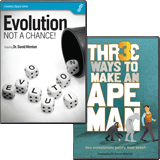
The Close Relationship Between Humans and Animals
PhysOrg: “New Hypothesis for Human Evolution and Human Nature” From pets to livestock, humans often have a close relationship with animals. But is that part of the story of human evolution?
Pennsylvania State University biological anthropologist Pat Shipman has a new theory on what she calls the “animal connection,” humans’ special relationship with animals. “Establishing an intimate connection to other animals is unique and universal to our species,” she says. Explaining the puzzle behind her new book The Animal Connection, she continues,
“Establishing an intimate connection to other animals is unique and universal to our species."
“No other mammal routinely adopts other species in the wild—no gazelles take in baby cheetahs, no mountain lions raise baby deer. Every mouthful you feed to another species is one that your own children do not eat. On the face of it, caring for another species is maladaptive, so why do we humans do this?”
In the book as well as a forthcoming journal article, Shipman argues that as ancient humans grew intelligent, some began to learn more about the food web through observation, eventually understanding the “behavior of potential competitors [and] reap[ing] a double evolutionary advantage.” Humans therefore domesticated the wolf/dog not for food (since “[w]olves eat so much meat themselves that raising them for food would be a losing proposition”), but rather to turn hunting competition into a “living tool.” She also points out that many other historically domesticated animals provide not meat (primarily), but rather “renewable resources for tasks such as tracking game, destroying rodents, protecting kin and goods, providing wool for warmth, moving humans and goods over long distances, and providing milk to human infants.”
As partial evidence of her theory, Shipman notes that the vast majority of “prehistoric” art (e.g., on cave walls) shows not plants, water, tools, weapons, or human relations but rather animals. Ultimately, Shipman concludes that the pressure for humans to develop language stems from our observations of and interest in animals.
By emphasizing humans’ caregiving role with animals over the years, Shipman is indirectly referencing Genesis 1:28—God’s command to Adam and Eve (and their descendants) to be responsible for wildlife and the animal kingdom. Humanity’s care and concern for animals (including responsible use) is not rooted only in self interest, but also in biblical mandate.
For more information:
Remember, if you see a news story that might merit some attention, let us know about it! (Note: if the story originates from the Associated Press, Fox News, MSNBC, the New York Times, or another major national media outlet, we will most likely have already heard about it.) And thanks to all of our readers who have submitted great news tips to us.
(Please note that links will take you directly to the source. Answers in Genesis is not responsible for content on the websites to which we refer. For more information, please see our Privacy Policy.)
Recommended Resources

Answers in Genesis is an apologetics ministry, dedicated to helping Christians defend their faith and proclaim the good news of Jesus Christ.
- Customer Service 800.778.3390
- © 2024 Answers in Genesis






